

Mass castrations: officers crack code of silence of followers of Indian guru Ram Rahim. Guru Gurmeet Ram Rahim Singh has 40 to 50 million followers around the world.
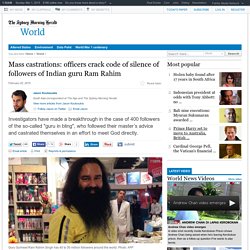
Photo: AFP Delhi: Many Indians will tell you that a sage guru can add a measure of potency to an otherwise mundane existence. Pity the 400 followers of the so-called "guru in bling", Gurmeet Ram Rahim Singh, who have followed their master's advice and castrated themselves in an effort to meet God directly. Officers from India's elite Central Bureau of Investigation (CBI) appear to have made a crucial breakthrough in a long-running investigation into the alleged mass castrations, last week gathering important testimony from victims and other witnesses as they prepare charges of grievous bodily harm against Ram Rahim. Gurmeet Ram Rahim Singh promotes his movie Messenger of God in the southern Indian state of Kerala earlier this month. The Mummified & gilded body of Shi Chiang Taiwanese Buddhist monk.
SHI CHIANG: THE FIRST CASE OF A MUMMIFIED BUDDHIST IN TAIWAN. Hindu philosophy. Hindu philosophy is traditionally divided into six āstika (Sanskrit: आस्तिक "orthodox") schools of thought,[1] or darśanam (दर्शनम्, "view"), which accept the Vedas as authoritative texts.[2] Four other nāstika (नास्तिक "heterodox") schools don't draw upon the Vedas as authoritative texts, and develop their own traditions of thought.
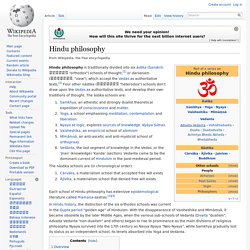
The āstika schools are: The nāstika schools are (in chronological order): Cārvāka, a materialism school that accepted free will existsĀjīvika, a materialism school that denied free will exists Each school of Hindu philosophy has extensive epistemological literature called Pramana-sastras.[3][4] In Hindu history, the distinction of the six orthodox schools was current in the Gupta period "golden age" of Hinduism. Overview[edit] Epistemology[edit] Epistemology in Hindu philosophy is called Pramāṇa (Sanskrit: प्रमाण).[5] It is a key, much debated field of study in Hinduism since ancient times. Buddhist philosophy. Nevertheless, Buddhist scholars have addressed ontological and metaphysical issues subsequently.
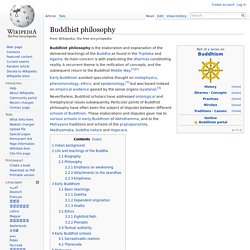
Particular points of Buddhist philosophy have often been the subject of disputes between different schools of Buddhism. These elaborations and disputes gave rise to various schools in early Buddhism of Abhidhamma, and to the Mahayana traditions and schools of the prajnaparamita, Madhyamaka, buddha-nature and Yogacara. Indian background[edit] Killing the Buddha.
Living goddess of Nepal: Pictures show preparations for festival. By Daily Mail Reporter Published: 21:15 GMT, 24 June 2012 | Updated: 08:16 GMT, 25 June 2012 Ornate: Nepal's living goddess locally known as Kumari, Samita Bajracharya, watches the last day of Rato Machhendranath chariot festival in Patan, outskirts of Katmandu, Nepal A ‘living goddess’ made a rare public appearance on Sunday to take centre stage at a religious festival in Nepal.

Perry Garfinkel: Four Noble Buddha Quotes. Isn't it - I can't decide whether to say "ironic" or "appropriate" - that modern technology now brings us wisdom that would otherwise have been considered oh so 2,500 years ago?
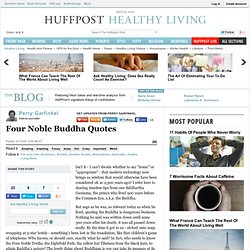
I refer here to sharing timeless tips from one Siddhartha Gautama, the prince who lived 500 years before the Common Era, a.k.a. the Buddha. But sage as he was, as relevant today as when he lived, quoting the Buddha is dangerous business. Nothing he said was written down until some 300 years after his death; it was all passed down orally. By the time it got to us - etched onto soap wrapping at 5-star hotels - something's been lost in the translation, like that children's game of telephone. Who knows, or should care, exactly what he said? "Believe nothing, no matter where you read it, or who said it, no matter if I have said it, unless it agrees with your own reason and your own common sense. " The Life of Buddha. Amongst White Clouds. American director Edward A.
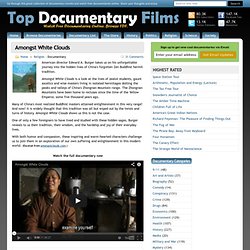
Burger takes us on his unforgettable journey into the hidden lives of China's forgotten Zen Buddhist hermit tradition. Buddha Wild: Monk in a Hut. Buddhist monks aren't usually described as wild(at least not in our urban dictionary), but director Anna Wilding's intriguing feature documentary debut stirs up the meditation room a bit.
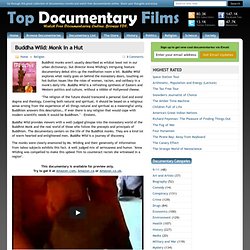
Buddha Wild explores what really goes on behind the monastery doors, touching on hot-button issues like the roles of women, racism, and celibacy in a monk's daily life. Buddha Wild is a refreshing synthesis of Eastern and Western politics and culture, without a nibble of Hollywood cheese. "The religion of the future should transcend a personal God and avoid dogma and theology. Covering both natural and spiritual, it should be based on a religious sense arising from the experience of all things natural and spiritual as a meaningful unity. Buddhism answers this description… If ever there is any religion that would cope with modern scientific needs it would be Buddhism. " – Einstein. Seven Wonders of the Buddhist World. In this fascinating documentary, historian Bettany Hughes travels to the seven wonders of the Buddhist world and offers a unique insight into one of the most ancient belief systems still practiced today.
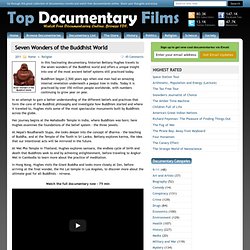
Buddhism began 2,500 years ago when one man had an amazing internal revelation underneath a peepul tree in India. Today it is practiced by over 350 million people worldwide, with numbers continuing to grow year on year. The Story of Lord Buddha. The Buddha, the founder of the great religious philosophy of Buddhism, lived in North India over two thousand and five hundred years ago and was known as Siddhattha (Siddhartha = one whose purpose has been achieved).
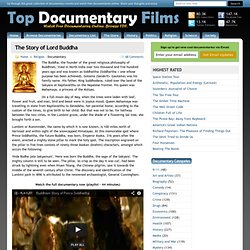
Gotama (Sanskrit= Gautama) was his family name. The Buddha. This documentary for PBS by award-winning filmmaker David Grubin and narrated by Richard Gere, tells the story of the Buddha’s life, a journey especially relevant to our own bewildering times of violent change and spiritual confusion.
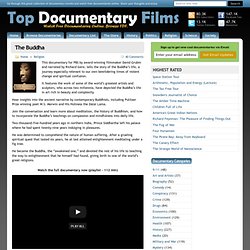
It features the work of some of the world’s greatest artists and sculptors, who across two millennia, have depicted the Buddha’s life in art rich in beauty and complexity. Hear insights into the ancient narrative by contemporary Buddhists, including Pulitzer Prize winning poet W.S. Merwin and His Holiness the Dalai Lama. Join the conversation and learn more about meditation, the history of Buddhism, and how to incorporate the Buddha’s teachings on compassion and mindfulness into daily life. Two-thousand-five-hundred years ago in northern India, Prince Siddhartha left his palace where he had spent twenty-nine years indulging in pleasures.
Gautama Buddha. The word Buddha means "awakened one" or "the enlightened one". Why I ditched Buddhism. For a 2,500-year-old religion, Buddhism seems remarkably compatible with our scientifically oriented culture, which may explain its surging popularity here in America. Over the last 15 years, the number of Buddhist centers in the United States has more than doubled, to well over 1,000. As many as 4 million Americans now practice Buddhism, surpassing the total of Episcopalians. Of these Buddhists, half have post-graduate degrees, according to one survey. Recently, convergences between science and Buddhism have been explored in a slew of books—including Zen and the Brain and The Psychology of Awakening—and scholarly meetings. Next fall Harvard will host a colloquium titled "Investigating the Mind," where leading cognitive scientists will swap theories with the Dalai Lama. Four years ago, I joined a Buddhist meditation class and began talking to (and reading books by) intellectuals sympathetic to Buddhism.
The insights imputed to meditation are questionable, too.